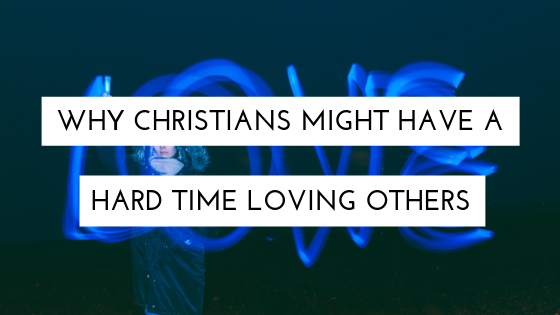Why Christians Might Have a Hard Time Loving Those Unlike Them
Unfollowing a Social Media Friend
A friend of mine posted on a social media that she wanted to rally some moms together to go to the Denver LGBT pride parade and give out mom hugs. And just to back up, it was an idea she got from Jen Hatmaker, who had done this in Austin. My friend loved the idea of taking those free mom hugs from Christians to our city and love on people who had been rejected by their parents or authority figures.
Now, full disclosure: when I initially saw her post and what Jen had done, I thought: I’m not so sure about this. I believe the Bible is clear that homosexuality is not God’s design for sexuality, and I think some small part in me thought that by doing this, I accepted the lifestyle. But then I immediately felt a check in my spirit. I was reminded of passages in the Bible where Jesus went to the sinners. He went to those who were lost and hurting and loved them. The woman at the well. The tax collectors and prostitutes. He went to their homes and the places they congregated.
If Jesus would go to them—not accepting their sin but loving them where they were—shouldn’t I do the same. Shouldn’t we? Perhaps Christians have spent too much time in the walls of their churches, homes, and Christian bubbles, afraid to encounter those unlike them.
And I saw this when my friend posted on social media that she wanted to gather some Christian mamas to go and show love to those who chose to live a different lifestyle. And I was all about that! But I noticed in her comments that a Christian woman said she would be unfollowing my friend on social media for suggesting such a thing. And my heart hurt.
Are Christians Withholding Love?
Have we become so self-righteous that we can’t love sinners? That we’re only comfortable to show the warmth of God’s love within the walls of the church? And maybe their reasonings relate to my initial thought associated with the Instagram post: if I show love, I’m accepting the sin.
Extending love to your neighbor doesn’t mean you endorse their choices. It means you see them as God does—someone he died for. And that was birthed in love.
Perhaps you are a Christian who is struggling to accept these words. But let’s take a look at what Scripture says, starting with the woman at the well.
Jesus Reaches Out to the Woman at the Well
In John 4, Jesus is traveling through Samaria, and he stops by a well. A Samaritan woman comes to draw water and Jesus asks for a drink. Her first response is, “You are a Jew and I am a Samaritan woman. How can you ask me for a drink?” Now, the reason the woman was thrown off guard is that Jews did not associate with Samaritans.
Furthermore, men did not speak to women in public. And even further, she was an adulterer. There were many cultural reasons for Jesus to not speak with this woman, and yet he broke through them all to meet her where she was.
Through this encounter, the woman came to believe Jesus and she then went immediately and told people in her village. From there, many came to accept Jesus as Lord. Let’s read verses 39-42 for the full scope:
“Many of the Samaritans from that town believed in him because of the woman’s testimony, “He told me everything I ever did.” So when the Samaritans came to him, they urged him to stay with them, and he stayed two days. And because of his words many more became believers. They said to the woman, “We no longer believe just because of what you said; now we have heard for ourselves, and we know that this man really is the Savior of the world.”
What if Jesus has refrained from going to the well because she was a Samaritan, or a woman, or an adulterer, or for all three reasons? If he had said, well, she’s not like me and if I go to her, that means I’m mixing with her lifestyle, she and many others would not have received salvation that day.
But this is just one of many instances when Jesus pushed aside notions that Christians shouldn’t associate with those on the fringe. In Luke 19, Jesus calls Zaccheus, a tax collector, to him and essentially invites himself into the man’s home. He is then admonished by people for going to the house of a notorious sinner. He’s also criticized for this in Luke 15:
Tax collectors and other notorious sinners often came to listen to Jesus teach. This made the Pharisees and teachers of the religious law complain that he was associating with such sinful people—even eating with them!
And if this isn’t enough, he died for them as he did for you—all sinners. We are all sinners. Romans 5:8, “But God showed his great love for us by sending Christ to die for us while we were still sinners.”
Created in His Image
Jesus loves those unlike you just as much as he loves you. Romans 2:11 says, “For God does not show favoritism.” So, I mean, I just have to say it, but being a Christian doesn’t mean you are loved by God any more than those who don’t follow Him. And to think that we are in two separate categories that can’t co-exist is wrong and sad. You were once separated from God and aren’t you so thankful He loved you then? Saw purpose and value for your life and rescued you? He has that same love and desire for everyone; we are all the work of his hands. He has created us all in His image.
Jesus, when asked in Mark 12 what the most important command is, he said to love God and to love your neighbor as yourself. This very call is our most important to live out. But your neighbor isn’t just your brother and sister in Christ, or the person next door, or those in your church. According to Luke 10, your neighbor is a person in need. A person unlike you. It’s everyone. The Muslim family down the street. The homosexual co-worker in the next cubicle. The homeless man on the street corner. We are all neighbors and called to love each other.
This is compassion. By its very definition, it’s getting in the middle of other people’s messes and heartaches and pain. It’s uncomfortable and inconvenient. And it’s usually hard. But this is what a believer is called to.
But let me also point out a few things this is not. Because some of you might be saying, as I mentioned before, that to love someone or go to where the sinners are is to endorse or support unwise living. This is just not the case. Not once when Jesus went to the sinners did he accept their lifestyle or choices. He didn’t get drunk with the drunkards or tell them to keep living life as usual. He still called them out of their sin. So I just want to make clear that you can love people without endorsing a choice or lifestyle that isn’t biblical.
Interestingly enough, it also doesn’t mean we overlook sin, particularly in the life of someone who says they are a Christian. Because what I don't want you to walk away with it this idea that loving people means you gloss over sin or brush things under the rug because that’s not what love does. In fact, love will confront. But ultimately, we don’t neglect sin in someone’s life in the name of love or because they label themselves a Christian. Jesus said in 1 Corinthians 5:11, “But now I am writing to you that you must not associate with anyone who claims to be a brother or sister but is sexually immoral or greedy, an idolater or slanderer, a drunkard or swindler. Do not even eat with such people.”
Loving Those Unlike You
You can love people without condoning the sin. And you should love others; even those most unlike you. Now I know this has been a bit tough on the believers out there—I’m not very good at sugar coating—but I share only what I’ve wrestled with in my own life. But I firmly believe Jesus’ heart is for us, the church, the body of Christ, to love all well. Especially those not within the fold.
So, let me ask you today: how well do you love those unlike you?
To hear the podcast episode on this post, listen here.


